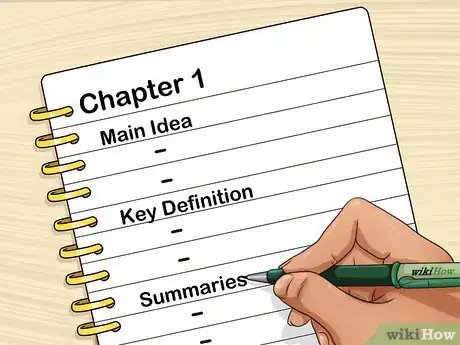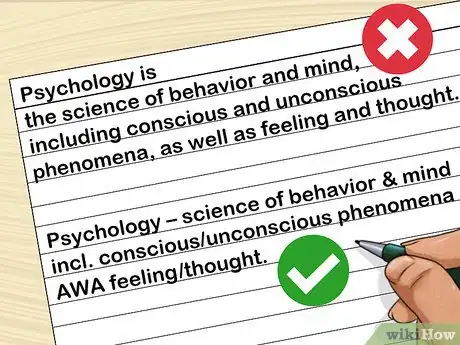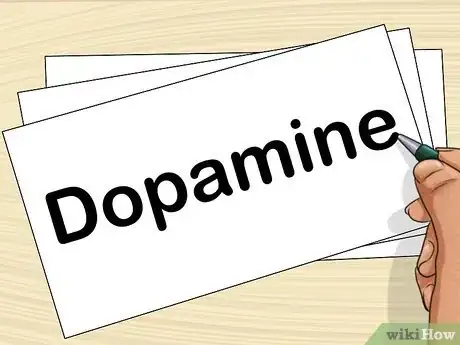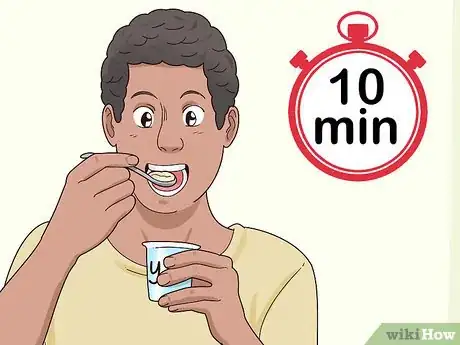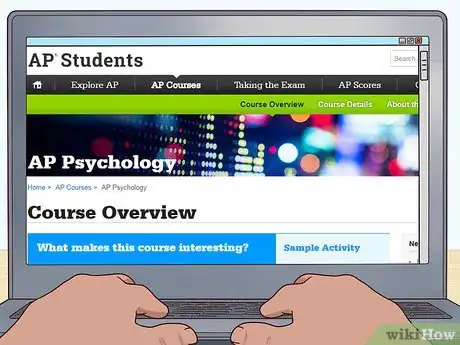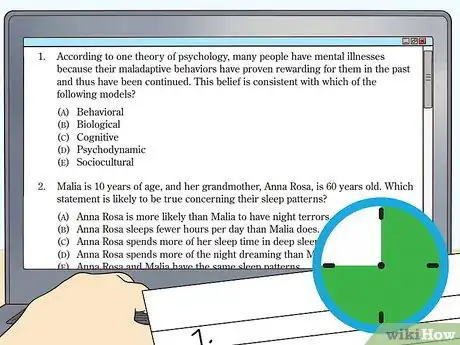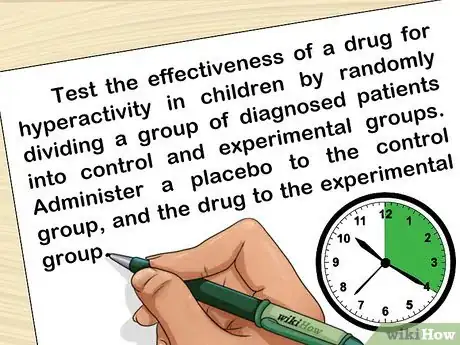This article was co-authored by Jake Adams. Jake Adams is an academic tutor and the owner of Simplifi EDU, a Santa Monica, California based online tutoring business offering learning resources and online tutors for academic subjects K-College, SAT & ACT prep, and college admissions applications. With over 14 years of professional tutoring experience, Jake is dedicated to providing his clients the very best online tutoring experience and access to a network of excellent undergraduate and graduate-level tutors from top colleges all over the nation. Jake holds a BS in International Business and Marketing from Pepperdine University.
There are 11 references cited in this article, which can be found at the bottom of the page.
This article has been viewed 15,583 times.
Advanced Placement (AP) Psychology is an intense course that covers broad content, and it’s capped by a rigorous cumulative AP exam. Try not to get overwhelmed! If you stick to a daily study routine, you’ll have a good shot at passing the course and acing the exam. Keep up with your daily assignments, since it’s easy to fall behind in such a fast-paced class. Above all, stay organized. Neat notes will help you study for unit tests, and they’ll prove invaluable when it’s time to study for the AP exam.
Steps
Perfecting Your Study Habits
-
1Make a rough outline as you read a textbook chapter. AP coursework is fast-paced, so do all of your reading when it’s assigned or you might fall behind. Keep your notebook handy when you do your assigned reading. Write down the chapter’s main idea, key definitions, and summaries of each section.
- If there’s anything that confuses you, write down questions to ask in class.
- Taking notes on your assigned reading can help you read more actively. Chapter outlines will also come in handy when you study for class unit tests and the AP exam.
-
2Summarize lectures in your class notes. Listen to and digest your teacher’s lecture instead of trying to write down everything they say verbatim. Use the notes you took on the assigned reading as a framework for your lecture notes. Take notes quickly by using shorthand and abbreviations, and avoid writing in complete sentences.
- Be sure to write down anything that your teacher says is important or will be on the test.
- It’s wise to exchange notes with a classmate to make sure you covered the lecture’s important details.
Advertisement -
3Make flashcards to study terms, concepts, anatomy, and methods. You’ll encounter hundreds of important definitions over the course of the semester. Make flashcards when you read the assigned chapters so you're not overwhelmed at the end of a unit. List the chapter’s key terms, write a term on 1 side of an index card, then write the term’s definition on the other side.[1]
- Experimental methods, the function of neurotransmitters, therapeutic techniques, and psychological disorders are just a few topics you’ll cover. You’ll need to know definitions for terms such as dependent variable, dopamine, hebephrenia, and psychodynamic therapy.
- Spend 15 to 30 minutes a night testing yourself on the terms that appeared in that day’s assigned reading. You could also have a parent quiz you or study definitions with a classmate.
- You can look at the College Board requirements of material covered on the test to get a sense of what terms will probably be most important.[2]
-
4Review your notes regularly to keep a bird's-eye view of the course. Every night, spend around 15 minutes reviewing that day’s lecture notes and your outline of the assigned reading. Then take another 30 minutes to skim your notes from the days and weeks prior.[3]
- If you study a little bit every day, you won’t have to cram the night before a unit test.
- Additionally, the AP exam is cumulative, so brush up on past units to keep information fresh in mind.
- Check the College Board topic by topic explanations of what will be covered on the test, which can help guide you toward the notes that will be most helpful to study.[4]
-
5Take a 10-minute break every hour that you study. Giving your brain regular breaks will help make your study time more effective. You’ll have a harder time retaining information if you lose focus and try to force yourself to power through for hours.
- Your brain also consumes lots of energy. Fuel up during your breaks by grabbing a small snack, like a yogurt or a handful of unsalted almonds.
- Try using a timer to keep track of when to take breaks.
Deepening Your Knowledge
-
1Connect terms and concepts to real-world situations. While you need to know lots of definitions, merely memorizing them won’t deepen your knowledge. Psychology is about the behavior and mental process of actual humans and other animals, so connect definitions to real-world examples.
- For example, if you’re learning about aversion conditioning, imagine a smoker getting a light shock every time they reach for a cigarette. This type of therapy aims to build a negative association with a habit or behavior, so it’s often used combat addictions.
-
2Participate in psychological research. Ask a local university’s psychology department if any professors or students are conducting psychological studies. Find out if they’re looking for test subjects or research assistants, and participate in any way you can.[5]
- You’ll need a firm grasp of experimental methods, and participating in psychological research will provide valuable first-hand experience.
- Reaching out to college professors and students can be intimidating, but try not to be worried. Professors are usually eager to help young people interested in their research, and it wasn’t long ago that college students were in your shoes.
-
3Master APA-style writing. American Psychological Association (APA) style is the standard manual for fields related to psychology. While you won’t need to cite texts on your AP exam, mastering the language and principles of APA style will improve the quality of your essays.[6]
- For instance, APA-style writing is formal, so no abbreviations or contractions, and minimal humor, if any. It should also be straightforward, so no metaphors or unnecessary jargon.
- It’s also important to use unbiased language free of negative connotations, especially when identifying people with disorders. For example, use “patients with schizophrenia” instead of “schizophrenics.”
- Your teacher will cover APA style in class. If your school has a writing lab, you should also work with them to improve your general writing skills.
-
4Attend all study and exam prep sessions your teacher offers. AP teachers typically hold numerous study sessions outside of normal classroom meetings. Take advantage of every opportunity you can to get extra help, especially 1 to 2 months prior to the AP exam in May.[7]
- Review your notes, past tests, and other materials prior to a study session. Identify test questions that gave you trouble or spots in your notes that need clarification. Bring these questions and concerns to your teacher during study sessions.
- Additionally, try to attend any experiments, field trips, guest speakers, or other activities your teacher offers outside of class.
Acing the AP Exam
-
1Take advantage of College Board’s online resources. College Board is the organization that oversees AP courses and exams. Visit their website for exam tips, practice tests, and examples of essays at all quality levels. You’ll have a much better shot at success if you familiarize yourself with the exam format instead of going in blind.[8]
- See College Board’s AP Psychology resources at https://apstudent.collegeboard.org/apcourse/ap-psychology.
-
2Start studying your class notes at least 1 to 2 months before the exam. You do not want to put off studying until the last minute. The AP Psychology exam will require you to demonstrate knowledge from every topic you’ve covered in class. Keep organized notes throughout the year, make flashcards, and start preparing for the May exam in March.[9]
- AP Psychology courses cover 14 topics, which include history and approaches, research methods, cognition, developmental psychology, and abnormal psychology. Your assignments and class sessions will be organized according to these topics.
- Spend 1 to 2 nights studying a topic; review your notes, flashcards, and answer practice questions on that topic. Within a month, you’ll have reviewed each topic in depth.
- You can also break studying into a week per topic, or even half a week per topic leading up to the AP test.
-
3Spend less than 45 seconds on each multiple choice question. When you sit for the test, you’ll have 1 hour and 10 minutes to answer 100 multiple choice questions. Keep an eye on the clock, and avoid spending too much time on 1 question.[10] If you can’t figure out the answer in under a minute, skip the question and, if you have time, return to it later.[11]
- If you skip a question, make a note in your test booklet (not on the answer sheet), or fold over the booklet's page corner.
- If you’re stuck between 2 potential answers, take a guess. You'll receive points for questions you get right, but you won’t lose points for blank or incorrect answers.
- This first section of the exam counts as 66.6% of your score.
-
4Read the free response questions carefully. You’ll have 50 minutes to write 2 essays; together, they count for 33.3% of your score. Look for task verbs, such as “identify,” “explain,” or “describe.” Note everything an essay prompt asks for so you don’t write an incomplete response.[12]
- The free response questions might ask you to design, analyze, or explain a psychological experiment, identify and describe a disorder or therapeutic method, or use a particular theoretical framework to analyze a hypothetical patient or pattern of behaviors.
-
5Make a 5-minute outline for each essay question. Keep an eye on your time, and don’t take too long to write your outlines. Come up with a thesis or a statement that summarizes your experiment design. Organize your essay’s paragraphs with Roman numerals or bullet points, then start writing the essay.[13]
- Write your outline on a blank page in your test booklet. You won't be allowed to bring scrap paper to the test.
- You should definitely outline your responses to stay organized and prevent rambling. However, you need to spend less than 5 minutes on each outline. Only the 2 essays themselves will be graded. You won’t receive credit for an outline if you don’t finish an essay.
-
6Spend 15 to 20 minutes on each essay. There’s no need to waste time on a thorough introduction. Just write your thesis, then get into the meat of your essay. There’s no length requirement, but you’ll need to compose complete sentences and well-organized paragraphs and fulfill all of the prompt’s requirements.[14]
- Suppose you’re prompted to design a drug experiment. Your summary statement could be, “Test the effectiveness of a drug for hyperactivity in children by randomly dividing a group of diagnosed patients into control and experimental groups. Administer a placebo to the control group, and the drug to the experimental group.”[15]
- Your paragraphs should then focus on specific sub-topics. The first could discuss sampling, or the patients receiving a placebo and the new drug.
- The next paragraph could discuss your methods. Specify that the study is double-blind, which means the patients and experimenter do not know which group receives the actual drug.
- Then, explain how to compare observations of the patients before and after the experiment to evaluate the drug’s performance relative to the placebo.
Community Q&A
-
QuestionWhat is the best way to study for AP Psychology?
 Jake AdamsJake Adams is an academic tutor and the owner of Simplifi EDU, a Santa Monica, California based online tutoring business offering learning resources and online tutors for academic subjects K-College, SAT & ACT prep, and college admissions applications. With over 14 years of professional tutoring experience, Jake is dedicated to providing his clients the very best online tutoring experience and access to a network of excellent undergraduate and graduate-level tutors from top colleges all over the nation. Jake holds a BS in International Business and Marketing from Pepperdine University.
Jake AdamsJake Adams is an academic tutor and the owner of Simplifi EDU, a Santa Monica, California based online tutoring business offering learning resources and online tutors for academic subjects K-College, SAT & ACT prep, and college admissions applications. With over 14 years of professional tutoring experience, Jake is dedicated to providing his clients the very best online tutoring experience and access to a network of excellent undergraduate and graduate-level tutors from top colleges all over the nation. Jake holds a BS in International Business and Marketing from Pepperdine University.
Academic Tutor & Test Prep Specialist Base your study strategy off of the College Board requirements for the AP tests. They've already broken the test into units, so you can prepare your study notes according to what's covered in each unit after you've learned the topic in class.
Base your study strategy off of the College Board requirements for the AP tests. They've already broken the test into units, so you can prepare your study notes according to what's covered in each unit after you've learned the topic in class. -
QuestionI did all these things and still failed, I'm taking the course again, so what should I do this time?
 Community AnswerTry to interest yourself in the material. Instead of forcing it into your brain, it is much less tiring and you are more motivated.
Community AnswerTry to interest yourself in the material. Instead of forcing it into your brain, it is much less tiring and you are more motivated.
References
- ↑ https://apstudent.collegeboard.org/apcourse/ap-psychology/course-details
- ↑ Jake Adams. Academic Tutor & Test Prep Specialist. Expert Interview. 24 July 2020.
- ↑ https://www.psychologicalscience.org/observer/how-should-students-study-tips-advice-and-pitfalls
- ↑ Jake Adams. Academic Tutor & Test Prep Specialist. Expert Interview. 24 July 2020.
- ↑ https://psychcentral.com/blog/how-to-succeed-in-psychology-class/
- ↑ http://open.lib.umn.edu/psychologyresearchmethods/chapter/11-1-american-psychological-association-apa-style/
- ↑ https://www.psychologicalscience.org/observer/how-should-students-study-tips-advice-and-pitfalls
- ↑ https://apstudent.collegeboard.org/takingtheexam/preparing-for-exams
- ↑ https://apstudent.collegeboard.org/apcourse/ap-psychology/course-details
- ↑ Jake Adams. Academic Tutor & Test Prep Specialist. Expert Interview. 24 July 2020.
- ↑ https://apstudent.collegeboard.org/takingtheexam/about-exams
- ↑ https://apstudent.collegeboard.org/apcourse/ap-psychology/about-the-exam
- ↑ https://apstudent.collegeboard.org/apcourse/ap-psychology/exam-tips
- ↑ https://apstudent.collegeboard.org/apcourse/ap-psychology/exam-tips
- ↑ https://secure-media.collegeboard.org/apc/psychology-released-exam-1994.pdf
- ↑ https://www.psychologicalscience.org/news/releases/take-notes-by-hand-for-better-long-term-comprehension.html
